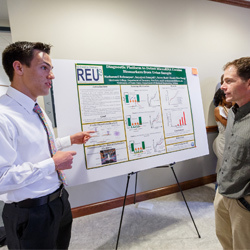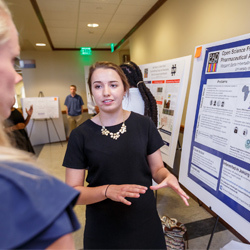 Nathan Rehmeyer, Skidmore College, presents his research
Nathan Rehmeyer, Skidmore College, presents his research
This summer the University of Notre Dame welcomed twelve students to campus to participate in the NSF-funded Research Undergraduate Experience (REU) program in analytical chemistry. The 10-week residential program is open to rising sophomore, junior, and senior undergraduates at four-year colleges, with backgrounds in chemistry, biochemistry, biology, chemical engineering, computer science, and mechanical or electrical engineering. It offers students the opportunity to work with Notre Dame faculty on various research projects aimed at solving analytical problems in the developing world, and “teaches students how to engage with a project at the instrumental and experimental design level.”
There were 12 projects that students could apply for, on subjects ranging from medical imaging development to coral proteogenomics. For instance, Nathan Rehmeyer worked with Satyajyoti Senapati to develop a portable test that would detect long-term cocaine use on the “genetic level” of a patient’s body. Rehmeyer, of Skidmore College, started with the multifunctional polymer biochip platform, developed at Notre Dame and used thus far to test for Dengue Fever and some cancers, and designed a new nano-membrane and probe for the biochip that would test for cocaine. Rehmeyer explained that the rising statistics of cocaine abuse in the US and his personal experience as an EMT on his college’s campus drew him to this particular project.
 Professor Marya Lieberman listens while Muriel McClendon, Chicago State University, presents her research
Professor Marya Lieberman listens while Muriel McClendon, Chicago State University, presents her research
Muriel McClendon worked with the program’s director, Marya Lieberman, on the Paper Analytical Device (PAD) project, developing a new lane on the PAD to detect aniline in medications. McClendon, a chemistry major at Chicago State University, had little prior experience with analytical chemistry and credits the program with building her confidence as a chemist and teaching her to write an abstract, create a research poster, and present her work articulately at academic conferences.
 Margaret Berta, Notre Dame, presents her research
Margaret Berta, Notre Dame, presents her research
Margaret Berta worked on the Distributed Pharmaceutical Analysis Lab (DPAL) project, also with Lieberman. DPAL provides analysis of pharmaceutical samples from the developing world and reports substandard samples to regulatory agencies. Berta, a student at Notre Dame, worked on developing an open science framework (OSF) for safe data sharing between the various US institutions carrying out the testing.
For more information about the Analytical Chemistry REU and future programs visit the Analytical Chemistry REU page.
Originally published by Chontel Syfox at science.nd.edu on August 22, 2016.